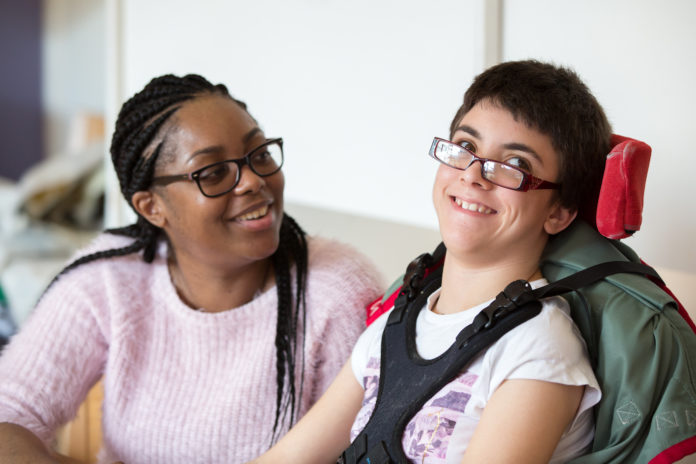
Norwood is the largest Jewish charity in the UK supporting vulnerable children and families, children with special educational needs and people with learning disabilities and autism.
Passionately believing that everyone, irrespective of abilities or circumstances, has a right to live the life he/she chooses and achieve his/her goals, Norwood delivers life-changing services to thousands of people across London and the South East in a Jewish environment.
Founded in 1795, and the only Jewish charity to enjoy the patronage of Her Majesty The Queen, Norwood is proud of its rich history of helping the community’s most vulnerable people.
For families affected by breakdown, bereavement, mental health problems or who need support to bring up children, they offer everything from parenting classes to counselling, social work and support groups.
From primary to secondary school, they provide specialist educational support, including educational psychology, occupational and speech and language therapies, in order to help children with learning disabilities reach their full potential.
Services for adults with learning disabilities encourage independence and choice by providing accommodation options, social work and access to learning, leisure, volunteering and work opportunities.
Norwood has begun taking a UK Birthright trip to Israel for young people with learning disabilities and last year saw the first dedicated assistive technology ‘smart’ home to improve residents’ lives.
These services, and many others, are delivered by a workforce of over 2,000, made up of 1,250 staff and hundreds of dedicated volunteers.
They cost £34 million a year to run, £12 million of which was raised through voluntary donations.
“Norwood is there whenever and however a family needs us,” says Ron Brown, Director of Services.
“Of course, there are challenges but we can change lives.
“Learning disability covers a multitude of areas so our offer is a specific spectrum for individuals.
“Donations are essential as without them, we would not be able to have specialist facilities such as eye gaze technology so we are very grateful to all our donors.”
“Attitudes to disability have changed hugely over the years,” says Abi Levitt, Director of Fundraising and Marketing.
“Now it’s about integration and getting people to do the most they can.
“The way the State behaves though, has changed over the last decade. They are peeling back everywhere so we are fighting constant battles with local authorities.
“They might say that someone needs 25% less support so a great degree of our time is spent trying to reinstate support.
“Our drive is for excellence but it’s a battle because as a charity, our voluntary donations are so important.
“Government cuts may be rife but the Jewish community’s expectations in terms of the level of care has not changed.”
“The community rightly expects a really high standard of care though the challenges are greater and ever-changing,” says Ron.
“The hardest part of my job is when we have to say “No” to a family who want our help. I’ve had to turn away 14 families during my 20 months at Norwood because we didn’t have sufficient place.
“My ambition would be to say that we never need turn any Jewish family away.
“The intentions of everyone from the Board down is to provide the best possible service to families, but it is heartbreaking at times.
“We do what we can to get care elsewhere but it’s a fact that the more people that donate to us, the more we can build our services.”
With donations becoming more essential year on year, how does Norwood encourage the next generation to give donations in a tough economic environment?
“If money is tight then people can give their time,” says Ron.
“If someone is unable to give Norwood say, £10 a month it is like saying one can’t afford three cups of coffee, but we accept that, so we ask people to sign up to a challenge and there are lots of options.
“Not enough people commit a few hours a week to learn how to help an individual. With training they could help someone go out, which would be a wonderful thing to do.”
Moreover, volunteers really help Norwood provide incredible care.
“It would cost £2million a year to provide the time our volunteers give,” says Abi.
“Without them, there are things people simply could not do on their own. Our volunteers give people a quality of life they would not have.”
Donations though, are key but attitudes towards giving are changing.
“Post-war Jewish communities made a commitment to its political and charitable institutions,” Abi explained.
“Wealthy and not so wealthy people in our community take charitable giving really seriously compared to other communities, but we are hugely reliant on a small number of people who have seen charity as a duty.
“Many charities are after the same donors but young people, for whatever reasons, don’t seem to have as much ‘free’ funds as their predecessors.
“The idea of charitable giving has changed from the generation of grandparents and great-grandparents so we have to find new ways to engage with everyone.
“There are loads of ways to fundraise from marathons to cycle rides, parachute jumps, a ladies’ lunch, breakfast clubs and so on.
“We’ve been doing challenges one way or another for 25 years, which brings us in a level of income and also creates a huge community.
“We also have eight charity shops and there are lots of people who give, from a low monthly level to one-off pleas, at Rosh Hashanah and Pesach.
“Everything helps towards our overall goal and it’s so worthwhile.”
Furthermore, donations can give a family peace of mind for a loved one.
“I was talking to the parents of a severely autistic son living independently in one of our accommodations who took part in a cycle challenge on a tandem bike,” recalled Abi.
“He’d been brought up in a very capable, loving family. Both parents were in their early 60s and starting to think about the future. They had used Norwood’s services and when I asked what we meant to them the father told me he could die now.
“When I asked what he meant, he said that if he or his wife passed away, there were brothers and sisters, but their son had a life, they knew where he was going and would be cared for.
“This was a family who could cope but Norwood stepped in when it was right for the family., Not all families can cope and we are there with them.”
Charitable giving is undoubtedly changing for a plethora of reasons and there is concern at Norwood about younger members of the Jewish community.
“My biggest worry is the next generation of donors,” said Abi.
“Developing a habit of giving to Jewish charities post-barmitzvah is so important.
“The community is generally affluent, so a responsibility should be to start a habit of giving. But if money is an issue then at least give time as it’s a social responsibility.
“Having resources within the community to offer a Jewish experience to those who need it and who can’t provide it for themselves is absolutely fundamental, but it doesn’t always seem to be seen as a priority.
“I’d like to have donors for life They might give to half a dozen Jewish charities, which is great, but we’d like regular donors.
“Giving £10 a month rising to £20 and then maybe £50 would be so welcome. We are aware there might be a dip with a first mortgage, then children, but donors might then come back with £100 a month.
“One of the most difficult things for a charity is people giving a one off £1000 and then we don’t hear from them for another decade.
“Circumstances change over a lifetime – we understand that, but I’d rather have a donation of £100 a year for 10 years, because we know that is coming in.
“It’s about developing a habit and young people are the most vulnerable for us.”
Ron also noted that working in the charity sector was not seen as a career which is a point Abi took up.
“There are phenomenally able people but not enough see working in the Jewish charity sector as a good career and we don’t know why,” she said.
“They give a huge amount of time. We have fantastic brains in the community and that could be of enormous benefit to a lot of charities.”
Despite all the challenges they face, Jewish charities make a huge impact.
“The social care sector is a tough environment and it’s very tough to be very good,” Abi noted.
“The Jewish community has something to be phenomenally proud about with the services and care we offer – whether it’s Norwood, Jewish Care, Kisharon and others.
“The level of care and involvement our charities provide is quite astonishing.”
Furthermore, with Rosh Hashanah around the corner, Ron has a message to the Jewish community.
“I work with and for the community, but absolutely stand by families and children,” he said.
“We have expertise and will fight for the very best that we can accomplish for people.
“The coming days are a period of reflection so I’d ask parents when they hug their child and experience loving, family moments, “How it would feel for a mother to give her child over to a non-Jewish environment because Norwood didn’t have a solution?”
“The hardest part of my job is when I have to say “No” to Jewish families who need us. What do I say to a mother who says ‘But we’re Jewish”?
“For anyone considering giving to a charity, think of Norwood.
“We want people to be safe, happy and enjoy a fulfilling, active life.
“I’m really proud of what we achieve, our services are rated by external regulators as ‘good’ or ‘outstanding’, which is rare across this sector, never mind the Jewish sector.”
Two case studies, involving Georgia and Adem, illustrate the impact Norwood makes on the Jewish community.
Georgia had a very difficult childhood.
Her mum suffered from mixed personality disorder, with long periods of depression, so she wasn’t always able to look after her or her younger brother.
Sometimes, Georgia had to be both a sister and a mother to him.
Georgia had health and emotional issues that were neglected and recurring, which left her vulnerable to bullying at school. She was isolated, with little self-confidence.
Thankfully, Norwood stepped in to help Georgia’s family.
Norwood’s social worker, Alex, was at the heart of that support.
Georgia could always rely on Alex who gave her the strength to believe in herself and see that life could be better.
“Alex helped make the transition to a new school a lot less scary for an 11-year-old with problems both at home and in school,” she recalled.
Appointed head girl at her high school last year, she was proud of her achievements.
For the past two years, Georgia has worked at Norwood’s Unity service at Redbridge, where she used to play and socialise with other children, something she would never have had the chance to do without Norwood.
Georgia’s passionate about helping others who are going through what she went through.
She wants them to know that Norwood is here for them and that they can speak to people like Alex. Georgia wants them to have a future they can be proud of, just like she has.
“Norwood’s confidence in me meant I could move on and make positive changes in my life,” she says. “They never let me down.”
At the age of two, Adem was diagnosed with autism.
His parents were told he’d never develop, speak or be able to look after himself.
They naturally hoped doctors were wrong and tried everything they could to help him develop.
But as Adem’s dad, Edy, recalled, as Adem got older and stronger, he was getting more uncontrollable.
Adem moved to Ravenswood, aged 11, at Norwood’s collection of homes in Berkshire, where he could get specialist support.
Edy would collect Adem every weekend to take him home. But once his mum came instead and took a wrong turning whereupon Adem flew into a rage.
After this, he wouldn’t get into a vehicle again.
Adem couldn’t go anywhere, even to medical appointments. It made him feel isolated and brought on self-harming and challenging behaviour.
Ravenswood staff set up a programme for Adem, taking tiny steps to encourage him to accept being in a car again.
It started with him just looking at a car, then touching the handle, then opening the door, then sitting inside during short trips around Ravenswood and then going on the motorway. It took a year, but the patience and perseverance of staff meant Adem can now be in a car for up to an hour.
As he overcame this fear, Adem realised he could take on other challenges and with the help of his iPad, Adem has started making more choices and verbalising what he wants, from films he’d like to see to food he fancies eating.
He can even ask for a range of drinks now, whereas previously he could only request tea.
What may seem straightforward to others took years of dedication, specialist communication, and trust for Adem to achieve.









